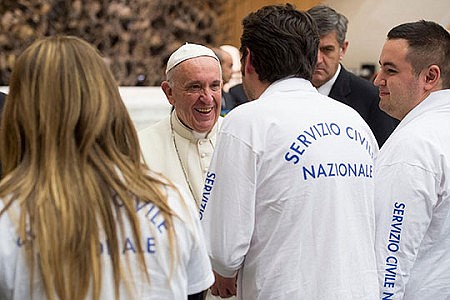Grace, not money, must guide financial choices of religious, pope says
July 29, 2019 at 12:37 p.m.

By Cindy Wooden | Catholic News Service
VATICAN CITY -- Just as "the habit does not make the monk," taking a vow of poverty does not automatically mean a consecrated person lives with a detachment from material things and in solidarity with the poor, Pope Francis said.
In fact, "the hypocrisy of consecrated men and women who live like the rich wounds the consciences of the faithful and damages the church," the pope said in a written message Nov. 26 to treasurers of religious orders.
Taking a vow of poverty and having no personal property is not fulfilling the vow "if my institute allows me to manage or enjoy all the goods I desire," the pope told the religious, who were in Rome for a symposium on economics and religious life.
The founding "charism" -- literally "grace" -- or ideal of a religious order is not "static or rigid," the pope said. Rather, members of orders must continually look at the world and the church and discern how God wants that original grace to be lived in the world today with the human and material resources the order has.
In the world at large, but particularly in religious life, he said, what one does with money is never morally neutral: "Either it contributes to building relationships of justice and solidarity or it generates situations of exclusion and rejection."
Inspired by the founding charism and realistic about an order's resources, the pope said, "we are called to create fraternity, communion and solidarity with the poorest and most needy" without being distracted or waylaid by the "diabolical logic of profit -- the devil often enters through the wallet or credit card."
As the majority of members of many religious orders age and as building maintenance costs increase, he said, orders have to be serious about discerning whether or not a particular work or project is an authentic response both to the order's charism and to the needs of people today.
Projects that are not sustainable should be closed or the order should find other religious orders or church groups with a similar focus to help continue the work.
Sometimes, he said, discernment will lead an order to keep open a work that will never be financially self-supporting.
Works that are always worth continuing, the pope said, "give dignity back" to those whom society often discards: "the unborn, those who are sick and aged and those with serious disabilities."
Members of religious orders are called to be models for the world of a Christian way of dealing with money and economic decisions, he said. "It must start with the little daily choices. Everyone is called to do his or her part, to use goods in a way that promotes solidarity, to care for creation" and to ensure that a religious community is not living extravagantly better than the people in the neighborhood.
[[In-content Ad]]Related Stories
Saturday, July 27, 2024
E-Editions
Events
By Cindy Wooden | Catholic News Service
VATICAN CITY -- Just as "the habit does not make the monk," taking a vow of poverty does not automatically mean a consecrated person lives with a detachment from material things and in solidarity with the poor, Pope Francis said.
In fact, "the hypocrisy of consecrated men and women who live like the rich wounds the consciences of the faithful and damages the church," the pope said in a written message Nov. 26 to treasurers of religious orders.
Taking a vow of poverty and having no personal property is not fulfilling the vow "if my institute allows me to manage or enjoy all the goods I desire," the pope told the religious, who were in Rome for a symposium on economics and religious life.
The founding "charism" -- literally "grace" -- or ideal of a religious order is not "static or rigid," the pope said. Rather, members of orders must continually look at the world and the church and discern how God wants that original grace to be lived in the world today with the human and material resources the order has.
In the world at large, but particularly in religious life, he said, what one does with money is never morally neutral: "Either it contributes to building relationships of justice and solidarity or it generates situations of exclusion and rejection."
Inspired by the founding charism and realistic about an order's resources, the pope said, "we are called to create fraternity, communion and solidarity with the poorest and most needy" without being distracted or waylaid by the "diabolical logic of profit -- the devil often enters through the wallet or credit card."
As the majority of members of many religious orders age and as building maintenance costs increase, he said, orders have to be serious about discerning whether or not a particular work or project is an authentic response both to the order's charism and to the needs of people today.
Projects that are not sustainable should be closed or the order should find other religious orders or church groups with a similar focus to help continue the work.
Sometimes, he said, discernment will lead an order to keep open a work that will never be financially self-supporting.
Works that are always worth continuing, the pope said, "give dignity back" to those whom society often discards: "the unborn, those who are sick and aged and those with serious disabilities."
Members of religious orders are called to be models for the world of a Christian way of dealing with money and economic decisions, he said. "It must start with the little daily choices. Everyone is called to do his or her part, to use goods in a way that promotes solidarity, to care for creation" and to ensure that a religious community is not living extravagantly better than the people in the neighborhood.
[[In-content Ad]]









